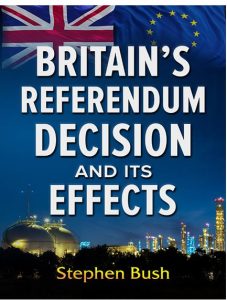A letter to the Times which was published on Friday, June 8th 2012.
Lord Owen’s assertion that the British people should be given a direct say in our future relationship with the European Union by way of a referendum is dead right, but the choices posed by the question must be options which are in the British Government’s power to enact (report, June 7). His question 1 – “Do you want the UK to be part of the single market in a wider European community?” – is both too vague and not something that this country can give effect to, involving as it does an unknown number of other countries which may or may not wish to be in Lord Owen’s outer circle.
The countries with which the UK would be associated under the Owen plan are all, with the exception of the Czech Republic, present and former members of the European Free Trade Area (Efta). Why invent another grouping? Britain cannot force the present four members of Efta to accept us back but informal soundings suggest that we would be welcome to rejoin. If the other former members also chose to rejoin Efta that would be fine by us but it would be their decision not ours.
The only choice, therefore, that can intelligibly be put before the British people is: “In or out of the EU?” There is no middle way, disagreable as this may be to the British political class with its addiction to fudge.
A letter to the Editor of the Daily Telegraph which was published on 4th June 2001 about the question for a referendum on the euro.
The Gallup poll on attitudes to abolishing the pound, reported Thursday and MORI’s (reported today), illustrate the importance of the wording of the question in any referendum on the issue.
Like the question proposed by Labour’s Foreign Secretary (reported May 27) Gallup and MORI seek a yes or no to “joining” or “membership of” or “being part of” the euro. This question is doubly loaded.
First, these phrases will always tend to elicit a yes from the British because of their association with the word “club”, a concept invented by the British and widely used in other languages. Manifestly a currency is not a club.
Secondly, to seek yes or no to a single proposition without stating the alternative is about as unbiased as asking the electors in the forthcoming election to say yes or no to the Labour candidate with no other name on the ballot paper.
The only unbiased way to decide the issue is to put the two propositions: (a) “keep the pound as our currency” and (b) “replace the pound with the euro”, on the ballot paper together and ask the voter to mark their preference with a cross, just as in the general election.
Judging by my own observation of posing the question to people either in the Gallup/MORI way or in the normal ballot paper way, the proportion in favour of keeping the pound rises from about 67% with the former way to about 80% with the latter. If in a follow-up question you tell people that article 30 of the relevant Maastricht protocol on adopting the euro involves an irreversible transfer of about a third of our gold and dollar reserves to the European Central Bank in Frankfurt, with foreign control over the rest, the proportion rises to 90%. Perhaps the Conservatives should re-read the Maastricht Treaty and tell the public about this now.
A letter to the Daily Telegraph which was published on 13th March 1996.
The letter from Beryl Goldsmith (March 12th) and your editorial (March 8th) underline the crucial importance of the wording in any referendum.
In 1975 the Wilson government test-marketed several candidate questions to enable it to choose the one which it thought would be most likely to secure a Yes vote.
In canvassing on the streets, the Campaign for an Independent Britain has consistently found that if people are asked to sign a petition against joining the Single Currency, about 50% are inclined to do so. When it is explained that it means abolishing the pound as our currency, about 90% will sign. Strange as it may seem, until it is pointed out, many people do not see that the two are one and the same thing.
It is vital therefore that if a referendum is organized, those who fervently want our country to continue to exist as a self-governing nation, must insist that the question is essentially, “Are you in favour of abolishing the pound sterling as our national currency and using the new Euro-currency in its place?”


